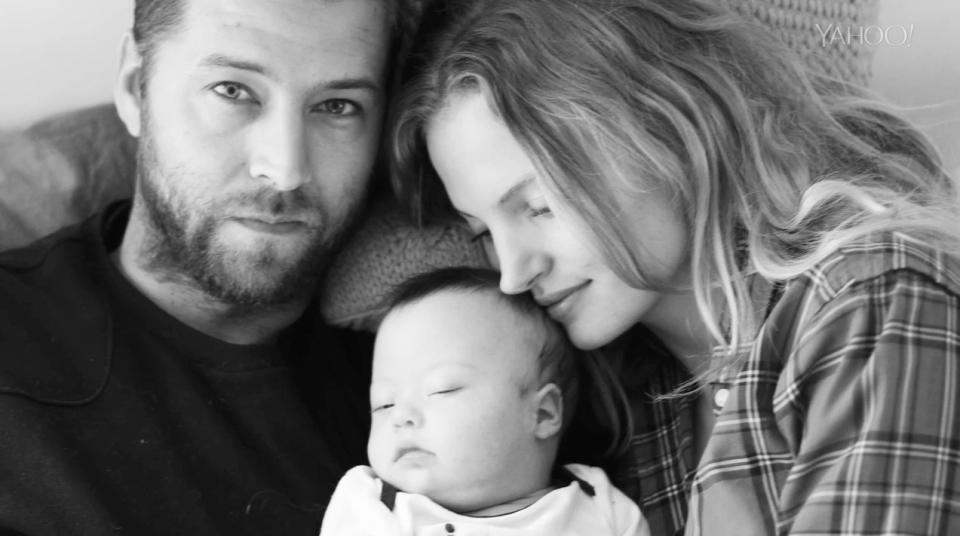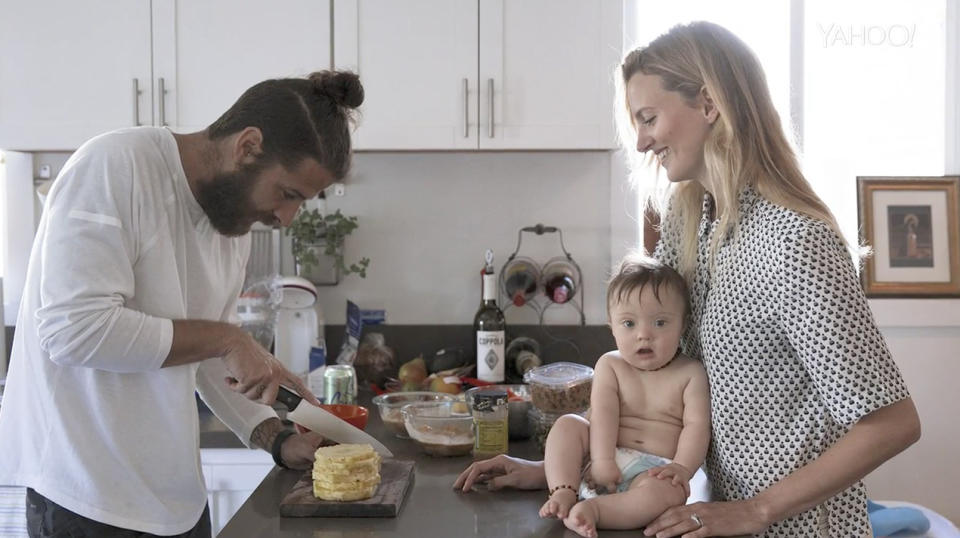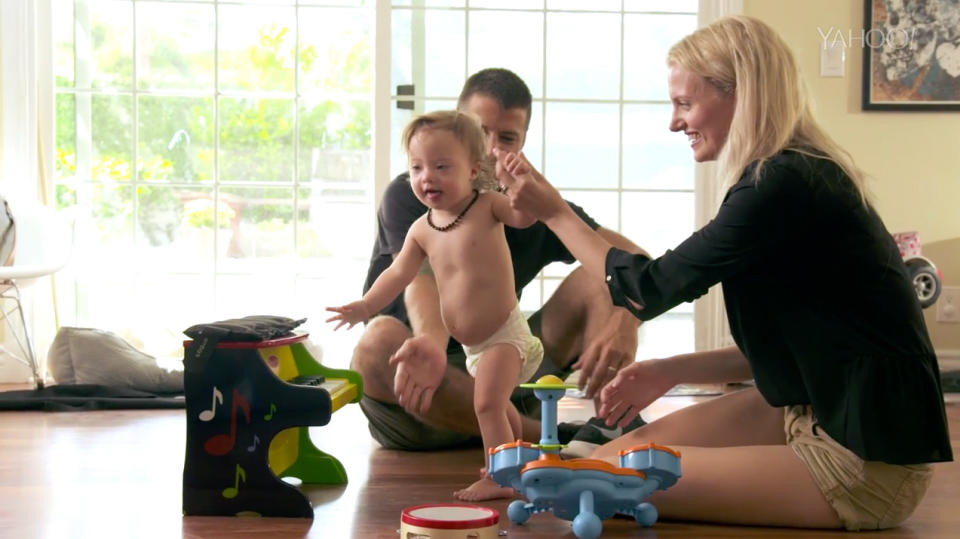'Incredible' Way Model's Life Changed Forever After Son's Down Syndrome Diagnosis
When Amanda Booth looks back on her pregnancy with son Micah, she remembers bliss. The model, 29, and her businessman husband, Mike Quinones, 32, were “just kind of happily floating through the whole [thing],” she recalls. But as her due date approached — and a specialist estimated their boy weighed a mere four pounds, 13 ounces, at 35 weeks — the reality that their son would likely face medical difficulties “kicked in,” she says.
Doctors told the Huntington Beach, Calif. parents-to-be that the baby was either going to be growth restricted or have the bone-growth disorder Achondroplasia. So little did they suspect, just four months later, that they would get his life-changing diagnosis: Down syndrome. “It seems like a challenge at times,” Booth says of her now 14-month-old son in a bittersweet, inspiring interview with Yahoo Parenting about the experience as part of Yahoo parenting’s “What It’s Like” original video series. “But, in fact, we’ve realized that it’s this huge blessing.”

(Photo: Yahoo Parenting)
STORY: How One ‘Miracle’ Baby Beat the Odds After Being Born at 25 Weeks
When Micah was born at 38 weeks “everything seemed perfectly fine,” Booth reveals. “They did all the vitals and everything was…wonderful.” The parents-to-be had opted against prenatal genetic testing because “to us, the outcome wouldn’t have made a difference,” says the mom. “We just didn’t really want to stress about anything and also quite frankly I wasn’t in an age range where there should have been things to worry about.”
STORY: To My Daughter With Down Syndrome on Her Wedding Day
A couple of hours post-birth, “a staff pediatrician came in and asked if we had done any testing while I was pregnant,” Booth says. “She said, ‘He has some features here. His eyes are a little slanted and his ear’s folded in. It could be because of being growth restricted or it could be because he has Down Syndrome.’"
“I was taken aback because there are tests within an ultrasound, which we did do, of measurements where they did say, ‘It doesn’t appear that he has Down Syndrome. It doesn’t appear that he has Spina Bifida,’” she continues. “And our personal pediatrician came to visit, and based off of looking at him said, ‘I don’t think there’s anything to worry about here. I don’t think he has Down syndrome. Go home. Enjoy your baby. If, in a few months, he’s not cognitively developing, then maybe we’ll do a test.’ A seven-vial-of-blood test on a four-pound baby was not something that we wanted to do.”
The couple chose to do Micah’s testing at three months, following a doctor’s appointment when the baby’s muscle tone appeared a bit weak. “’In the one-percent chance he has this… I just want to be ahead of it,’” she recalls the child’s pediatrician advising them about the chromosomal disorder that the Centers for Disease Control and Prevention says effects one in every 700 babies. And during those early months pre-diagnosis, the parents admit that they had moments of wondering. “We would take pictures…and every once in a while be like, ‘Well, I kind of see it,’” says Booth. “And then at a totally different angle, we’d be like, ‘No. We don’t see it at all.’"

(Photo: Yahoo Parenting)
At first, the mom admits, “I would cry and say, ‘What if he does have Down syndrome? What are we going to do?’ But Mike just always said, ‘It will be fine. He’s Micah. He’s here and he’s still going to be our boy.’ It was that simple for him, and that really helped me to calm down about the whole thing and see it from a different place.”
Down syndrome was “scary” for her, Booth admits, “because I had never met someone with [it] in my entire life. I knew nothing about it other than that there would be delays. I thought at the time, ‘Would he be able to go to school? Have friends?’ No matter what you have in your child, those are the exact same fears for every mother,” she adds. “But they were just amplified.”
Getting the results of the blood test took an agonizing 30 days. “Every time the phone would ring…there’d be a lump in my throat,” says the mom, noting that they also feared the test would show Micah had Leukemia because Booth says that her son was born with a low white-blood-cell count. When their pediatrician called and said he was going to come to their home to share the results, Booth says, “I went there. I was like, ‘Oh, my gosh. [Micah] has cancer.’”
In the end, getting that Down syndrome diagnosis “was the most incredible experience” coming from a pediatrician with whom they’d become close, and “since we were battling with it for those four months of it being a possibility, it was a lot easier at that point to accept and move on because there was already a little part of me, and of my husband and our whole family, that accepted the possibility, you know?” she says. “So there was about five minutes of sadness and then, ‘Okay. This is life. This is where we go forward from here.’ And that was it.”

(Photo: Yahoo Parenting)
The biggest help in terms of their adjustment, though, was “that we already knew our son, and that we already could see that physically, cognitively, he was fighting really hard,” she says. The boy’s “stubborn” character showed them “he was going to do what he wanted to do anyway,” says Booth. “So after we educated ourselves, we realized how off-base we were about everything, I was anyway, and that Micah was going to be just fine.”
When their pediatrician asked on diagnosis day if they wanted information of what to expect, Booth says: “My husband and I declined. We didn’t want to box in our son because of how something has been in the past, because if you know anything about Down syndrome at all, you know that is it drastically changing generation to generation.”
That’s not to say that she didn’t have her moments of frantic web searching for answers. “But Mike would yell at me,” she admits. “He’d say, ‘Stop. Stop doing that. Why would you be sad that the Internet says that our son’s not going walk until he’s three? Because that might not be the case.’”

(Photo: Yahoo Parenting)
Indeed, after once weekly therapy and daily work helping him to learn to stand and practice walking — “It’s like baby boot camp all day every day in our household,” Booth brags — Micah is on the verge of walking on his own. “So now, we see [our lack of Down syndrome background] as this blessing, because we have no idea how a child is supposed to develop or what they’re supposed to be doing,” she says. “We’re just working with him and he’s doing things and that’s it…We are so involved with Micah all day every day that we notice everything….all of these tiny, little things that maybe some parents, just by the nature of life and being busy, don’t even get to see that happened. And so the hard stuff, and the extra stuff, that we have to do really is such a blessing as a parent.”
Booth says that she really doesn’t mind the slower pace of her son’s development. “Because it takes him a little bit longer, we get to live in [each stage] of life a little bit longer. I really enjoy the fact that my 14-month-old is not pulling down my plants and running in the street and I get to just, like, hang out with him and cuddle him and play with him for a little bit longer. It’s nice….He draws you in and he makes you be here.”
Her grandfather, she reminisces, “used to say, ‘Life is like toilet paper. The quicker you get to the end, the faster it goes.’ And now we are lucky that we can’t do that…We get to be living life every day and to try to make it as big for Micah as possible, which makes our life big and powerful and enriched.”

(Photo: Yahoo Parenting)
Of course, Booth still confesses some concerns about the future. Micah has hypothyroidism, for one, and socially, the mom fears for him. “I just don’t want him to ever feel invisible or less important or unable,” she explains. “He’s so able. Is he going to understand that he’s a little bit different and that it’s okay?” But she’s choosing to focus on today, spending as much time with Micah as she can — and entrusting him to her live-in mother’s care when she has modeling work. (She even got her son signed on with her agency.)
“We were meant to be Micah’s parents because we don’t treat him any differently and we will guide him and support him 100 percent of the way,” Booth declares. “And what we get back from him is pretty darn incredible. So it works out.”

(Photo: Yahoo Parenting)
Parents “read all…about people saying, ‘Your life is going to be changed forever for the better [having a child with Down syndrome],’ and in the moment, you’re like, ‘They’re just blowing smoke because that’s the PC thing to say,’” says Booth, “but then you get there and you realize how absolutely true it is.”
Little Micah, she explains, “gives me a love that I never thought was possible…He’s so sweet and he loves to hug and [does] everything that someone will typically say about a person with Down syndrome…and it’s amazing. He’s a lover. He’s sweet. Why would you ever not want those things?”
Please follow @YahooParenting on Facebook, Twitter, Instagram, and Pinterest. Have an interesting story to share about your family? Email us at YParenting (at) Yahoo.com.

